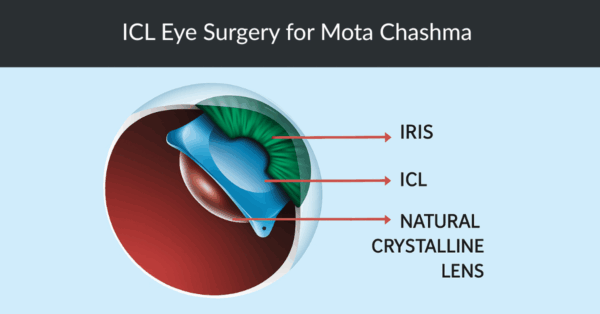ICL Eye Surgery for Mota Chashma Removal – See the World Clearly Again
Do thick glasses (mota chashma) or contact lenses slow you down? If LASIK, SILK, or PRK were not recommended, ICL (Implantable Collamer Lens) at Shroff Eye Centre can be a safe, precise and comfortable alternative.
At Shroff Eye Centre, patients choose cutting-edge technology plus personalised care at every stage — before, during and after surgery. With over 100 years of trusted eye care and experienced surgeons like Dr. Rushad Shroff, Dr. Ritu Arora, Dr. Dariel Mathur, and Dr. Apoorva Aggarwal, your vision is in expert hands.
Watch: ICL Eye Surgery Explained by Shroff Eye Centre
What is ICL?
ICL (Implantable Collamer Lens) is a lens implanted inside the eye, positioned in front of your natural crystalline lens. Unlike contact lenses, it does not sit on the eye surface. Unlike LASIK or PRK, it does not remove corneal tissue — making it ideal for patients with very high prescriptions, thin or irregular corneas, or those who are not candidates for laser surgery.
- Suitable for very high prescriptions (up to -18D and beyond with advanced planning).
- Works for thin or irregular corneas where laser is unsafe.
- Toric ICL corrects combined spherical and cylindrical errors (astigmatism).
- No corneal tissue removal — reversible and preserves corneal strength.
Who Should Consider ICL Eye Surgery?
ICL may be recommended for people who:
- Have high myopic prescriptions (very strong glasses / mota chashma).
- Are not suitable for LASIK / PRK due to thin or irregular corneas.
- Require toric correction for astigmatism alongside spherical power.
Note: Eligibility is confirmed only after a thorough pre-surgery assessment.
Pre-Surgery Evaluation – Safety Comes First
Before surgery, we perform precise tests to customise your ICL and ensure safety:
- Eye pressure measurement (IOP)
- Cornea shape & thickness (topography/pachymetry)
- Retina examination
- Glaucoma screening
- Anterior chamber depth measurement
- Specular microscopy to assess corneal endothelial cell health
The Day of Surgery – Comfort & Precision
Your comfort and safety are our priority. Typical steps on the day:
- Patient preparation & counselling to keep you relaxed
- Antibiotic drops and pupil dilation
- Topical anaesthetic eye drops and mild sedation if needed
- Surgeon implants the ICL through a tiny 2.8 mm corneal opening
- Toric ICLs are aligned precisely for optimal astigmatism correction
- Procedure time: around 15–20 minutes for both eyes; same-day discharge
Recovery and Aftercare – Quick & Smooth
We operate one eye at a time. Most patients notice clearer vision the next day and can resume work/studies in a few days. Full visual clarity generally settles within 1–2 weeks.
Important Aftercare Tips:
- Avoid water entering your eyes for 2 weeks
- Reduce screen time initially
- Do not rub your eyes
- Use prescribed eye drops and medications as directed
- Attend scheduled follow-up visits; our team remains reachable for concerns
Safety and Minimal Risks
ICL is a highly safe procedure when performed with careful selection and post-op care. Potential, but uncommon, risks include:
- Slightly increased cataract risk over many years
- Rare rise in eye pressure (managed with monitoring and medication)
- Very rare infection
At Shroff Eye Centre, advanced imaging and experienced surgeons minimise these risks.
Why Choose Shroff Eye Centre for ICL?
- 100+ years of trusted eye care in India
- Highly experienced surgeons: Dr. Rushad Shroff, Dr. Ritu Arora, Dr. Dariel Mathur, Dr. Apoorva Aggarwal
- Cutting-edge technology and customised lenses
- Patient-first care with clear guidance about lifestyle after surgery
- Proven track record of excellent outcomes
Ready to See the World Without Mota Chashma?
If you were told you are not suitable for LASIK or PRK, ICL might be the perfect solution. Call now to book your consultation:
About Dr. Rushad Shroff
Dr. Rushad Shroff is one of Shroff Eye Centre’s leading surgeons, known for precision, patient-first care and expertise in advanced vision correction, cataract & IOL surgery, LASIK, and corneal disorders. His approach blends technical excellence with compassionate counselling.
Frequently Asked Questions
A: Yes — ICL is a safe option when patients are properly selected and followed up. Risks exist but are rare and managed proactively by our team.
A: Most patients achieve excellent distance vision. Reading glasses may be required later in life due to presbyopia (age-related near vision change).
A: ICLs are designed for long-term implantation and are removable/reversible if necessary.






 Call us
Call us Email us
Email us





